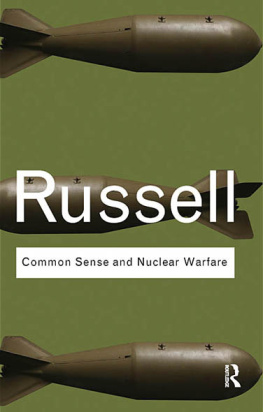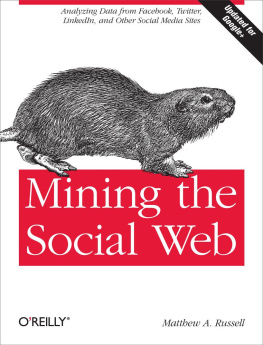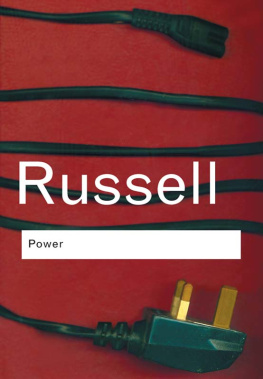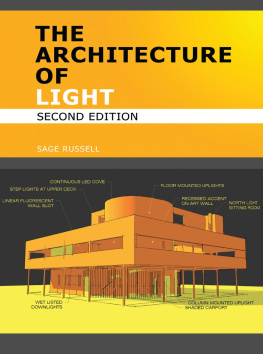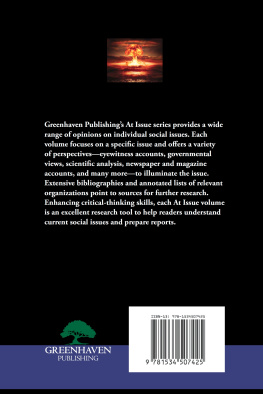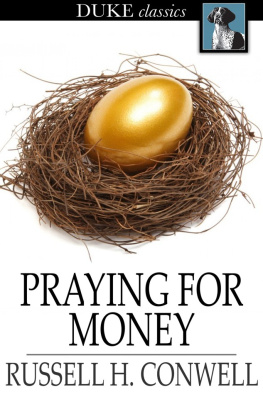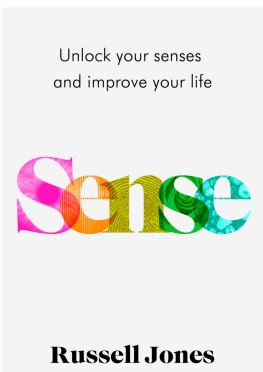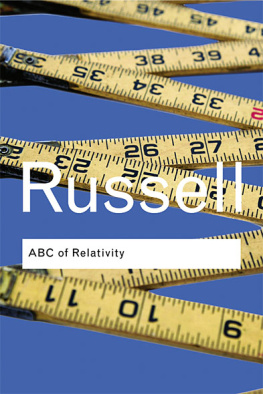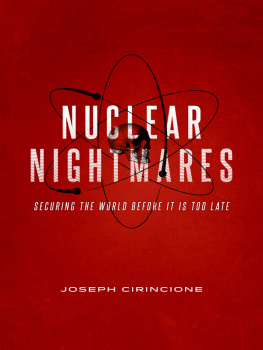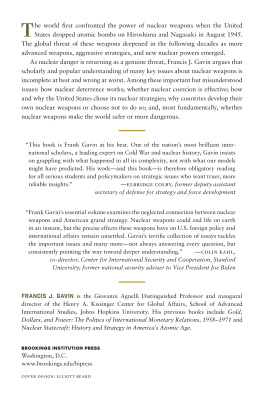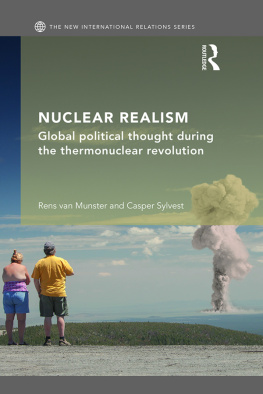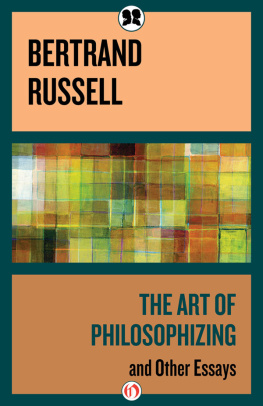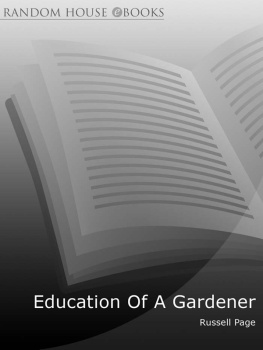Russell - Common Sense and Nuclear Warfare
Here you can read online Russell - Common Sense and Nuclear Warfare full text of the book (entire story) in english for free. Download pdf and epub, get meaning, cover and reviews about this ebook. year: 2009, publisher: Taylor & Francis, genre: Politics. Description of the work, (preface) as well as reviews are available. Best literature library LitArk.com created for fans of good reading and offers a wide selection of genres:
Romance novel
Science fiction
Adventure
Detective
Science
History
Home and family
Prose
Art
Politics
Computer
Non-fiction
Religion
Business
Children
Humor
Choose a favorite category and find really read worthwhile books. Enjoy immersion in the world of imagination, feel the emotions of the characters or learn something new for yourself, make an fascinating discovery.
Common Sense and Nuclear Warfare: summary, description and annotation
We offer to read an annotation, description, summary or preface (depends on what the author of the book "Common Sense and Nuclear Warfare" wrote himself). If you haven't found the necessary information about the book — write in the comments, we will try to find it.
Common Sense and Nuclear Warfare — read online for free the complete book (whole text) full work
Below is the text of the book, divided by pages. System saving the place of the last page read, allows you to conveniently read the book "Common Sense and Nuclear Warfare" online for free, without having to search again every time where you left off. Put a bookmark, and you can go to the page where you finished reading at any time.
Font size:
Interval:
Bookmark:
Common Sense and Nuclear Warfare
Bertrand Russells eloquent and lucid analyses and warnings should find a prominent place in the thinking of those who hope to reverse the seemingly inexorable drive towards self-destruction
Noam Chomsky

Routledge Classics contains the very best of Routledge publishing over the past century or so, books that have, by popular consent, become established as classics in their field. Drawing on a fantastic heritage of innovative writing published by Routledge and its associated imprints, this series makes available in attractive, affordable form some of the most important works of modern times.
For a complete list of titles visit
www.routledge.com/classics
Bertrand Russell

London and New York
First published 1959
by George Allen & Unwin Ltd.
First published in the Routledge Classics in 2010
by Routledge
2 Park Square, Milton Park, Abingdon, Oxon OX14 4RN
Simultaneously published in the USA and Canada
by Routledge
270 Madison Avenue, New York, NY 10016
Routledge is an imprint of the Taylor & Francis Group, an informa business
This edition published in the Taylor & Francis e-Library, 2009.
To purchase your own copy of this or any of Taylor & Francis or Routledges collection of thousands of eBooks please go to www.eBookstore.tandf.co.uk.
2010 The Bertrand Russell Peace Foundation Ltd
Foreword Ken Coates 2001
All rights reserved. No part of this book may be reprinted or reproduced or utilised in any form or by any electronic, mechanical, or other means, now known or hereafter invented, including photocopying and recording, or in any information storage or retrieval system, without permission in writing from the publishers.
British Library Cataloguing in Publication Data
A catalogue record for this book is available from the British Library
Library of Congress Cataloging-in-Publication Data
A catalog record for this book has been requested
ISBN13: 978-1-135-22359-5 ePub ISBN
ISBN10: 041548734X
ISBN10: 0203864840 (ebk)
ISBN13: 9780415487344
ISBN13: 9780203864845 (ebk)
Virtually the first words from the new administration in Washington declared their intent to proceed energetically with the National Missile Defense program, in the face of warnings even from their own intelligence agencies that this will greatly enhance threats to global and US security.
The Clinton administration had already urged Russia to move to a US-style launch-on-warning strategy, truly bizarre, specialists warned, particularly because in light of the deterioration of their control systems. Presidential directives continue to authorize first use even against non-nuclear states, and have extended nuclear capacities, which remain at the core of US strategic planning. Meanwhile proliferation proceeds in South Asia and the Middle East. In the face of such ominous threats, Bertrand Russells eloquent and lucid analyses and warnings gain heightened significance, and should find a prominent place in the thinking of those who hope to reverse the seemingly inexorable drive towards self-destruction.
Noam Chomsky
Common Sense and Nuclear Warfare was first published in 1959, in an effort to prevent the catastrophe which would result from a large scale H-bomb war. Nuclear technology had already evolved more and deadlier weapons, and these had created a new and more precarious balance of power. Public concern was growing. Russells views changed in the years following Hiroshima, and were to change again, as the arms race became institutional and ever more costly. Military planning soared away into the realms of fantasy, but the reality was that mankind had developed hitherto unimagined destructive capacities.
Inevitably, Russells writing about the bomb was dominated by the fact of the Cold War. Fear of Communism had already ranged the United States and its European allies into the North Atlantic Treaty Organisation. An Eastern Alliance, the Warsaw Treaty Organisation, had emerged shortly afterwards. Fear of Communism did not only stimulate military co-ordination: for a time, it also promoted economic co-operation, and the ascendancy throughout the West of what is now thought of as the Keynesian world order. These were to be the years of a social welfare consensus in Western Europe, and of the emerging Common Market. Public planning and governmental intervention prospered in the West European economy as never before. Undoubtedly leaders such as Jean Monnet drew support from the business communities with which they were working, on the supposition that their policies would help to fortify the institutions of liberal democracy in the West. Were not Stalins tanks massed along the newly defined Eastern border? And were not the Communist Parties in Italy and France able to count their votes in many millions?
But if the phobias of the time guaranteed a long period of full employment and relative prosperity, they also launched frenetic military competition. Ultimately the welfare consensus began to wear off: but the military confrontation proved more enduring.
Those who had worked on the development of the bomb in the United States had not expected that it should be tried out on cities without prior warning. They had presumed that a public test of its powers might be made at sea, or in some unpopulated area. In fact, the decision to bomb Hiroshima and Nagasaki seems to have had little to do with military exigencies in the war with Japan, which was already drawing to a close. The presumption of many, politicians and scholars alike, is that the first nuclear bombardment took place in answer to the felt need of the American leadership, to send a chilling message to the Soviet Union.
In a very short time, Stalin showed that he had understood, and the Russians detonated their own bomb four years after the Hiroshima explosion. The Soviet hydrogen bomb followed inexorably, just as had the American fusion device. The nuclear race was on. Soon after there opened the race to perfect intercontinental and other rockets, which might deliver the new weapons.
This contest was precisely encapsulated in the metaphor which Russell presented to describe it:
Since the nuclear stalemate became apparent, the Governments of East and West have adopted the policy which Mr. Dulles calls brinkmanship. This is a policy adapted from a sport which, I am told, is practised by some youthful degenerates. This sport is called Chicken!. It is played by choosing a long straight road with a white line down the middle and starting two very fast cars towards each other from opposite ends. Each car is expected to keep the wheels of one side on the white line. As they approach each other, mutual destruction becomes more and more imminent. If one of them swerves from the white line before the other, the other, as he passes, shouts Chicken!, and the one who has swerved becomes an object of contempt. As played by irresponsible boys, this game is considered decadent and immoral, though only the lives of the players are risked. But when the game is played by eminent statesmen, who risk not only their own lives but those of many hundreds of millions of human beings, it is thought on both sides that the statesmen on one side are displaying a high degree of wisdom and courage, and only the statesmen on the other side are reprehensible. This, of course, is absurd. Both are to blame for playing such an incredibly dangerous game. The game may be played without misfortune a few times, but sooner or later it will come to be felt that loss of face is more dreadful than nuclear annihilation. The moment will come when neither side can face the derisive cry of Chicken! from the other side. When that moment is come, the statesmen of both sides will plunge the world into destruction.
Font size:
Interval:
Bookmark:
Similar books «Common Sense and Nuclear Warfare»
Look at similar books to Common Sense and Nuclear Warfare. We have selected literature similar in name and meaning in the hope of providing readers with more options to find new, interesting, not yet read works.
Discussion, reviews of the book Common Sense and Nuclear Warfare and just readers' own opinions. Leave your comments, write what you think about the work, its meaning or the main characters. Specify what exactly you liked and what you didn't like, and why you think so.

